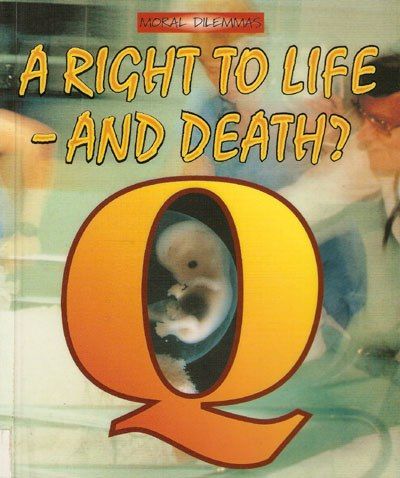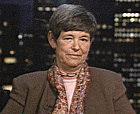 A Right to Life - and Death?
A Right to Life - and Death?"Moral Dilemmas" series
Kenneth Boyd
Evans Brothers Limited 1999
First Paperback Editions 2003
As a fan of the great detectives from Sherlock Holmes to Morse I'm always intrigued by a mystery, and as it happens, the other day a mystery was posted through my letterbox.
The above book was sent to me by a worried parent whose son is studying RE (Religious Education) at Key Stage 4, or the first year of an RE GCSE in old money, and was given the book for a project.
The book is divided into six chapters: rights in general, abortion, fertility treatment, transplantation, rationing health care and dying well. I had a few concerns about the book in general, but the book's treatment of abortion is symptomatic of its approach.
The reader is given a worked example, and I hope I can be forgiven for quoting from this at length:
Phew - there's so much going on in that extract it's hard to know where to start! For one thing, Kate and her husband went "reluctantly" to their doctor - why didn't the doctor pick up on this reluctance or, if you want, cognitive dissonance, and advise that they think about it?Kate is forty years old and has just discovered she is pregnant. She already has three children, two girls and a boy, aged seventeen, fifteen and and thirteen, respectively. A few years ago she and her husband, John, opened a small restaurant. It does well, but only because they both work very long hours. A month or so ago, rushing to catch the plane for their first weekend abroad for several years, Kate forgot to pack their oral contraceptives. She thought she was unable to conceive because of the time of the month, but when they got back home she was suspicious. She carried out a pregnancy test, and it was positive.
Kate and John discuss what they should do. All of their income goes on family expenses and the children's education. They can't afford to pay someone else to take on Kate's work while she has the baby, and if they are going to have another child, Kate wants to bring it up herself, as they did with the others before she went back to work.
They could give up their business and John could try to find another job. But they would earn a lot less and they would feel this would not be fair to their other children at this stage in their education. So, reluctantly, they decide to go to their doctor to ask if Kate can have an abortion. The doctor thinks that Kate and John have taken a responsible decision, and sends Kate to a hospital specialist who agrees to terminate her pregnancy. After further discussion with the doctors, Kate also has a sterilisation to prevent her having any further children.
For another, this dissonance is strengthened when we are told that "if they are going to have another child, Kate wants to bring it up herself", then we learn in the next paragraph that the poor woman has a sterilisation - so what form does the "further discussion with the doctors" take - do they have meaningful dialogue, or does this "discussion" takes place when she is having the procedure, possibly very emotional and vulnerable, with the doctors above her in every sense?
I could pick out many more things, but thirdly and lastly, I'm still concerned about Kate's sterilisation. Given that this is an early abortion, why do the doctors need to perform an invasive procedure going inside Kate's abdomen in order to ensure that the couple have no further children? Not much mystery there - the text says it's to prevent her from having further children. A shame, because it would be much simpler to perform a vasectomy, and any possible after-effects, say infection, would be far further from major organs. Perhaps John has something to tell her about his future procreative aspirations? And has she been given time to reflect that should she and her husband split up she is now infertile? I realise this isn't a post about marital fragility, but why, in our supposedly sexually emancipated society, are women expected to pay the price for their men's behaviour with and in their bodies?
All through the abortion section, there are panels giving opinions that I find one-sided. Please allow me to quote three of them. The first is from "Dr Daniel Callahan, Ethicist" in Abortion: Understanding Differences:
...abortion is a necessary evil, one that must be tolerated and supported until such time as better sex education, more effective contraception, and a more just social order make possible fewer troubled pregnancies. And even then, there will still be some justifiable reasons for abortion: it will never disappear.The second is shot through with the cold utilitarianism of Mill senior, and comes from "Professor Roger Higgs, General Practitioner" in the 1997 BMJ (British Medical Journal) New Dictionary of Medical Ethics:
In practice, it has been shown that women usually take great thought and pains to identify and minimise the harms, balancing different and competing harms in a nuanced way in considering whether to keep or terminate a new pregnancy. Such down-to-earth examples of compromise might put ethicists, politicians, campaigners, and religious leaders to shame, and convert the general question to the particular: "How much should this possible new life matter, in this situation and at this stage?"I might comment o
 n the above, that Pope John Paul II, quoted in a post by Radagast, turns the question of the relationship between the general and the particular on its head to shine a light on Kant's categorical imperative, which states that we should react to each individual situation as if its solution constituted a general law: "the function of [conscience] is to apply the universal
n the above, that Pope John Paul II, quoted in a post by Radagast, turns the question of the relationship between the general and the particular on its head to shine a light on Kant's categorical imperative, which states that we should react to each individual situation as if its solution constituted a general law: "the function of [conscience] is to apply the universal  knowledge of the good in a specific situation and thus to express a judgement about the right conduct to be chosen here and now". (Veritatis Splendor (The Splendour of Truth), para 32).
knowledge of the good in a specific situation and thus to express a judgement about the right conduct to be chosen here and now". (Veritatis Splendor (The Splendour of Truth), para 32).The third and last quote, which we are told comes from "Mother of unborn Down's syndrome son", is shorter:
If women understood that late abortions don't have to cause lasting trauma, fewer would feel obliged to give birth to a handicapped child.This quote from A Right to Life - and Death? vindicates Matthew Connelly's prophetic reference at the end of Fatal Misconception - the Struggle to Control World Population to people "faithfully reciting a eugenic catechism without the faintest idea of where it came from or where it can lead".
The mystery proper started when I started checking out the background to the book, when I kept getting a page on the Evans Publishing Group website saying "There were no matches for your search in the database. Please try again." Even when I managed to find a mention of the book on the publisher's site, when I clicked the link to the book I got the same screen.
And yet the book is in circulation. The Times Educational Supplement lists it in an article on "citizenship" books; East Lothian Council Library Service's TalisPrism search engine lists it in a mixed bag called the Coping Collection including also Alcohol, AIDS, and All by myself: the toilet training book; and I was initially worried to see that the independent children's books magazine Books for Keeps listed it in an article bemoaning the UK's rate of teenage pregnancies (by any definition abortion doesn't prevent pregnancy), but rather relieved that they included alongside it Cool and Celibate? Sex or no sex? by David Bull.
Further afield, New Zealand's Kids' Catalogue Web lists it as one of three books in a section called "Right to life juvenile literature", the other two being You wouldn't want to be a pyramid builder! and A to Zen: a book of Japanese culture.
The book certainly casts its net wide - in the first section, Rights, Life and Costs, there are pcitures of refugees in Rwanda, a public health scheme in Zaire ("poor countries have limited resources available and also find it difficult to provide services which will reach into the more remote areas of their often very large countries") and a vaccination scheme in India.
So it wasn't a surprise to find that A right to life - and death? is listed by Better World Books, which describes itself thus: "Better World Books collects and sells books online to fund literacy initiatives worldwide". It still froze my blood, though, to see that the project seems to have gotten the book into Botswana, where page 38 (41 in the .pdf linked to) it is listed under "moral education" in a "prescription list" of books for junior and senior secondary published by the country's Ministry of Education.
 It may seem that I'm against teaching children of an appropriate age about abortion, contraception, etc. Actually, I'm not. I'm of a mind with Wendy Wright, chair of Concerned Women of America, who says that if teachers are presented with a controversial subject, they should teach both sides of the controversy (she was debating with Richard Dawkins on why she thought evolution should be taught in schools alongside creationism).
It may seem that I'm against teaching children of an appropriate age about abortion, contraception, etc. Actually, I'm not. I'm of a mind with Wendy Wright, chair of Concerned Women of America, who says that if teachers are presented with a controversial subject, they should teach both sides of the controversy (she was debating with Richard Dawkins on why she thought evolution should be taught in schools alongside creationism).So, by all means, in state schools teach children that a woman has a right to choose abortion - as long as the un-negotiable humanity of the unborn baby is taught alongside and with equal value; show the results of studies showing that abortion has no side effects - as long as the many studies showing links to depression, breast cancer, later miscarriage, etc etc etc are presented alongside and with equal value; share the opinion that handicapped babies bring misery for themselves and hardship for their families into the world - as long as the objective value of all human beings from Steven Hawking to the kids in the special school down the road is taught alongside and with equal value.
It sounds a tall order, but anything else isn't education, it's propaganda. In fact, Sherlock Holmes' comment on The Strange Affair of A right to life - and death? might be the same as in The Adventure of the Devil's Foot: "To let the brain work without sufficient material is like racing an engine. It racks itself to pieces."
But I can't end this post with a quote from a fictional character. Here's the pro-choice aut
 hor Linda Bird Francke in her painfully honest work The Ambivalence of Abortion, talking about her own early abortion in the introduction ("I waited for my husband to burst through the door and yell 'stop', but of course he didn't") and finishing the section by stating what she experiences in quiet moments: "I wave at the baby. 'Of course we have room', I cry to the ghost. 'Of course we do.'"
hor Linda Bird Francke in her painfully honest work The Ambivalence of Abortion, talking about her own early abortion in the introduction ("I waited for my husband to burst through the door and yell 'stop', but of course he didn't") and finishing the section by stating what she experiences in quiet moments: "I wave at the baby. 'Of course we have room', I cry to the ghost. 'Of course we do.'"











One can almost always find a "reason" not to risk having a baby. Many, if not most, are fears of a possible future that would not have materialized. Many times, wonderful things happen, when we take risks. I had all of my children at a late age (34+). All are wonderfully healthy. All are exceptionally bright. Our home would not be nearly so happy with even one less child.
ReplyDeleteBTW, on an unrelated note, you might enjoy checking this out:
ReplyDeletehttp://wdtprs.com/blog/
I checked out the link, and I think my colleagues were starting to worry about me, as I was nodding at the screen so much! Certainly the near-hegemony of the environmental agenda was a great worry to me in the RC Church. The justice-and-peace people in Cambridge at least, were in the sway of people who seemed to think that "saving the world" from something that we do not necessarily have any input into was more important than seeing to the traditional justice and peace agenda; and I think concerns were voiced from Rome about this movement being in very liberal if not left-wing hands.
ReplyDeleteMy Mum was left broken-hearted, not by the switch from the Tridentine Mass to the Novus Ordo per se, because the laity were kept in the dark, but by the time-scale; it was supposed to be a two-year switch-over, but happened in Scottish parishes in less than a month. She later complained to the Archbishop of Glasgow, and was sent a long letter that said almost nothing.
I agree with your first comment - you're never ready for children, are you? My Mum was 42 when she had me! - FD
SO many things to say! You hit the nail on the head when you called what is passed off as 'education' merely propoganda. These books and stories and "lessons" want to draw pity for something that should be celebrated.
ReplyDeleteI noticed that the twaddle given about late term abortions and handicapped children came from the mother of an UNborn DS child. You would never hear that from a mother who has given birth to one!
AND I noticed that the same mother (In the worthess scenario..) who could kill her child, couldn't think of leaving him in daycare... what the lesser of two evils?!
Can you tell my mood?! argh.
I'm going to check on that link too.....
Got another good 'un for you:
ReplyDeletehttp://regularthoughts.blogspot.com/
At home trying to get rid of (or ignore) a sinus headache....
I hear you Linda - perhaps the author of the book gives away more than he realises when he writes the scenario about "Kate".
ReplyDeleteSome more news - I sent back the book to the fellow who passed it to me; he phoned me to say his son's teacher admitted to the class that she's not too knowledgeable about the pro's and con's of abortion, but is educating herself, and is doing what she can to give a pro-life argument to counter the one-sidedness of the book, so it's not all dark. Also, it appears that a close relative of hers is seriously ill, and she's not at all happy about presenting topics related to euthanasia.
Pam - another great site - I've added this one to my blogroll! What does "flyover country" mean?
Sorry to hear you've got a sinus headache, my wife gets those, they're horrible.
Linda - keep up the "aargh" mood - it makes for great blogs! - FD
I'm thinking "flyover country" means places where airplanes don't stop. I could be wrong.
ReplyDeleteAh - I understand! I was thinking of motorway (freeway) flyovers that stratch over parts of inner cities in an ugly fashion. I suppose we're in flyover country here in Cambridgeshire, then: we have a small private airport, but it's used mainly for freight and military planes, but we get a lot of aircraft going over on their way to Stansted and Heathrow Airports. But Marshalls also houses some aldoer aircraft - we occasionally see biplanes doing acrobatics! What really made my day was when two spitfires and a Lancaster flew over! - FD
ReplyDeleteThat would be fun to see!
ReplyDeleteOnce, for the 4th of July (Independence Day, we went out on a boat over Clear Creek (a large bay on the Gulf, actually) and watched the fireworks display - huge showers of them, coming down directly on top of us and filling the sky. Preceding it was an air show of the AFB squadron. F16 fighter jets, tearing overhead, very low. It was, in a way, quite frightening. You could imagine how it would be if it was wartime. (It wasn't, then.)
I too can understand how it would be frightening, but on the other hand, I love aeroplanes and would've loved to see it!
ReplyDelete